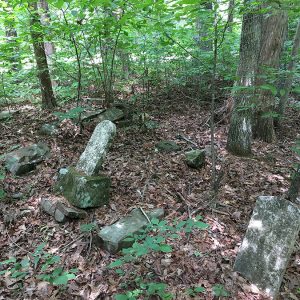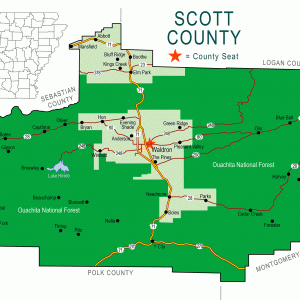calsfoundation@cals.org
Oliver (Scott County)
Oliver is an unincorporated community located in northwestern Scott County along Highway 28 north of the Poteau River. Agriculture has traditionally been important to the area.
Prior to European exploration, Oliver was a wilderness lush with native vegetation and numerous species of wildlife—including buffalo and elk, which no longer inhabit the area. Archaeological evidence from the Archaic, Woodland, and Mississippian periods has been discovered throughout the area. Additional evidence has indicated that the Caddo tribe had a strong presence along the Poteau River and other prominent waterways.
Throughout the late seventeenth and early eighteenth centuries, French trappers and explorers traveled west from the Arkansas Post along the Arkansas River. From there, they began traversing smaller tributaries such as the Fourche La Fave River and Poteau River. It is likely that they traveled through the area where Oliver is now located. There are also unsubstantiated stories of Spanish exploration in the western portion of Scott County.
White settlers began arriving in the area near Oliver as early as the late 1820s. The area continued to be settled from the 1830s to the early 1900s. Most early families participated in a wide variety of agricultural practices.
The Civil War affected people living in the area near Oliver, as it did throughout the rest of the Confederacy. Men who were called to fight in the war served with both the Confederacy and Union. Additionally, the women, children, and elderly were left to look after the homes and farms.
During settlement prior to the Civil War, Oliver’s only cemetery was established. The Anthony family established a family cemetery in 1859 on land that they owned. The cemetery was subsequently named after the family.
After Reconstruction, Oliver grew slightly with a small influx of people and several businesses, including a sawmill and lumberyard.
Oliver was presumably named after the Oliver family that settled several miles south of the town’s current location in the late nineteenth century. A cemetery named after the family is located where they originally settled south of Oliver near Lake Hinkle.
Oliver continued to grow in the early twentieth century. In 1901, the Arkansas Western Railroad, a subsidiary of the Kansas City Southern (KCS), built a 31.7-mile line east from Heavener, Oklahoma, to Waldron (Scott County) in order to service the coal and timber industries. Oliver was one of the communities located along the route.
The Oliver Post Office was established in 1903, with Marcus Harris as the first postmaster. The post office was discontinued in 1932 and the mail sent to Cauthron (Scott County).
In 1907, Oliver was one of several towns that received a telephone exchange with the Waldron Telephone Company.
Several members of the Oliver community served during World War II. In the early to mid-1940s, Cross Creek School District (Number 30) and New Home School District (Number 76) consolidated to form Oliver School District (Number 6). Previously, Lyons School District was Number 6 before it was closed. The Oliver School District was consolidated with Waldron sometime between 1949 and 1953. After the closure of the school, Oliver declined significantly.
During the 1970s and 1980s, a small store was located in Oliver. For a short time, the store was also a popular pool hall. No commercial infrastructure remains in Oliver. Anthony Cemetery is located just south of Highway 28 in a wooded area on private property. It is in a state of disrepair and has been overtaken by nature. Agriculture continues to be an important practice in the area, mainly in the form of cattle farms.
Florence Clyde Chandler, born in Oliver, was a plant geneticist who furthered the successful development of a derivative for the malaria remedy quinine.
For additional information:
Biographical and Historical Memoirs of Western Arkansas. Chicago: Goodspeed Publishing Company, 1891.
Cate, Michael. History of Scott County, Arkansas. Dallas: Curtis Media Corporation, 1991.
Goodner, Norman. A History of Scott County, Arkansas. Siloam Springs, AR: Bar D Press, 1941.
McCutcheon, Henry Grady. History of Scott County, Arkansas. Little Rock: H. G. Pugh and Company, 1922.
Ty Richardson
Richardson Preservation Consulting
 Anthony Cemetery
Anthony Cemetery  Oliver Highway
Oliver Highway  Oliver Railroad
Oliver Railroad  Scott County Map
Scott County Map 



Comments
No comments on this entry yet.